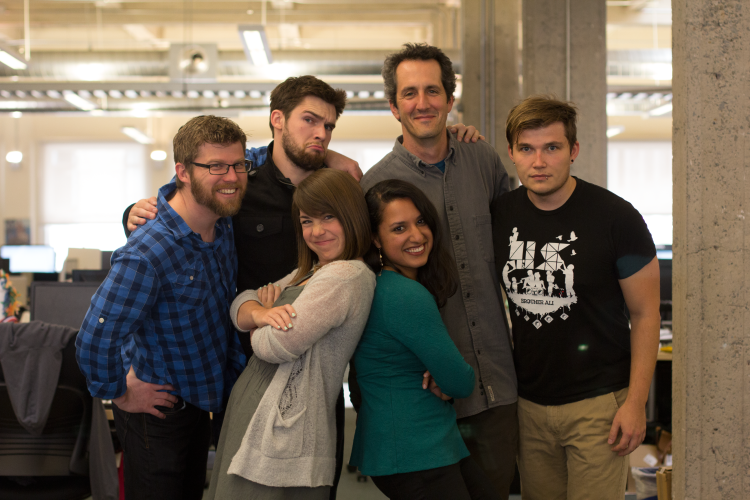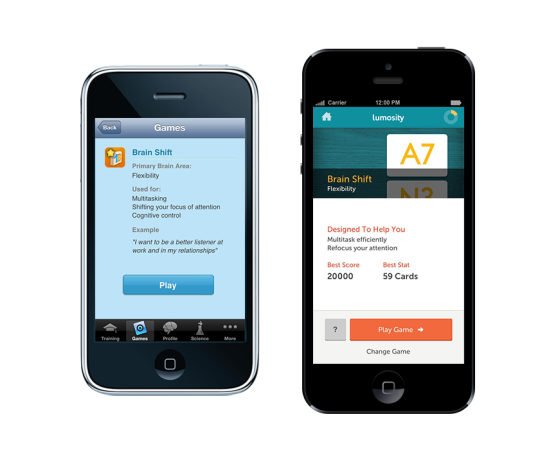Lumosity CEO Kunal Sarkar made a risky move in relaunching — and not just incrementally updating — his popular educational iPhone app, and early results show that the gambit was a good one.
Lumosity’s brain training games for the iPhone and now iPad (the Android version is still under development) are spreading fast, especially among those who believe the app can make them smarter. Chief executive Kunal Sarkar is reluctant to state that this is definitively the case, but he often describes the Lumosity experience as a “gym for your brain.”
When Lumosity’s app first launched on the App Store in 2010, it fared well, and raised a massive $32 million in venture funding in two years. The games built up a loyal base of players — roughly 15 million globally, according to Sarkar — and achieved high ratings.
But it wasn’t enough. Sarkar wanted an entirely new app with a redesign and fresh code base. A few members of the team immediately voiced opposition; the chief concern was that Lumosity would alienate its most committed fans.
However, early results show that the relaunched iPhone app has boosted ongoing mobile engagement rates 250 percent over the previous mobile version, and it become the No. 1 app in the education category of the U.S. iTunes App Store. People have played more than 35 million mobile brain games since re-launch, and the iPhone app currently has about 14,000 5-star reviews in the U.S. store.
Looking back, would he have done it any differently? Sarkar shared his tips with VentureBeat for the right (and wrong) ways to relaunch a mobile app, and boost your chances of reaching that coveted No. 1 spot.
VentureBeat: What’s new and different about this relaunched app?
Kunal Sarkar: We took all the learnings from the original app and applied them. We actually built the new app from the ground up with a completely different new code base and a redesigned experience. We tried to be responsive to everything we learned from users — and we’re talking 15 million [users] in two or three years.
VentureBeat: Why not just update the existing app?
Sarkar: We wanted to make fundamental changes, not just incremental improvements. We talked to existing users about what we had done and the way we did it. That transparency was the right approach for us. Relaunching the app really turbocharged both awareness and downloads.
VentureBeat: What could have gone wrong — but didn’t?
Sarkar: The more vocal subset of your users can get really upset if you make substantial changes. You risk getting terrible reviews. I think that’s the biggest thing that could have gone wrong for us. We managed this by doing more user testing and UX than we had ever done in the past. We launched the app first in Canada.
VentureBeat: So you launched the app first in international markets to gauge the reaction to the changes?
Sarkar: Yes. We got the chance to see what other markets and existing user-bases would react. We saw what they were excited about and what they missed about the old app. In December we launched in Canada. We spent the next six months iterating on that app, fixing it and making it better, and then relaunching it in different countries. We introduced it in the U.K. next, and then finally the rest of the world. By the time the U.S. came along, we pretty much know exactly how people would react.
VentureBeat: What advice would you give entrepreneurs considering relaunching their app?
Sarkar: Be ambitious, and don’t get too caught up about the fear of transition or change. Wow your users based on everything you know. The second part of that is to spend a lot of time testing your hypotheses. Spend time, more time than you think you need, mitigating any risks.
VentureBeat: Is there anything you would have done differently?
Sarkar: We struggled quite a bit with being bold. One of the gut-wrenching decisions involved having fewer games in the new app. We felt like we were taking something away. In this particular case, these concerns turned out to be very real. For the U.S. launch, we had a few things to fix about the feature-set.
VentureBeat's mission is to be a digital town square for technical decision-makers to gain knowledge about transformative enterprise technology and transact. Learn More




